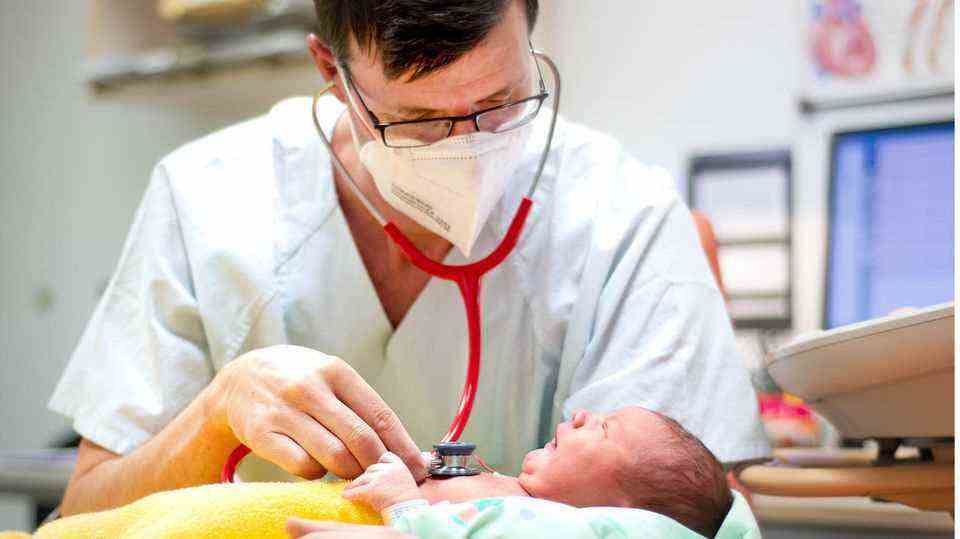dangerous trend
“As if you were playing with dynamite”: Four reasons that speak against a willful omicron infection
Experts warn against underestimating the omicron variant
© Lepro / Getty Images
In the USA, more and more people are willingly being infected with the omicron variant. They hope that this will give their immune system a natural boost – and they are playing with fire.
Omikron meanwhile sets new records every day. Never before have so many people in Germany been infected with Corona at the same time as now, in the fifth wave. And the peak has not yet been reached. Hans Kluge, Regional Director of the World Health Organization (WHO), has just caused a sensation with his prognosis that, according to model calculations, half of Europe could have been infected with omicron in six to eight weeks.
But that doesn’t worry everyone. On the contrary. After all, Omikron is considered a comparatively “mild” variant. In fact, some believe that infection could be more beneficial than harmful. Doctors in the US report the trend of people intentionally contracting the virus in the belief that it will boost immunity. “It spread like wildfire,” Robert Murphy of Northwestern University’s Feinberg School of Medicine told CNN. Anyone who tries to intentionally become infected is crazy. “It’s like playing with dynamite,” he says. Four reasons that speak against an intentional infection.
1. Even an omicron infection is not a cold
The omicron variant is highly contagious, but probably less dangerous to the individual than the delta variant based on current knowledge. Especially people who are boosted have a good chance that an infection will take a mild or moderate course. However, the term “mild” can be misleading. Because even with a mild or moderate disease, patients develop symptoms. Severe courses, long covid and deaths are also possible.
Symptoms of omicron documented in the “ZOE Covid” study included headache, fatigue, body aches, lower back pain and loss of appetite. Experts also call one of the most characteristic symptoms of omicron a dry, sore throat. Tim Spector, head of the ZOE study, said in December that about 57 percent of people with omicrons reported a sore throat.
The US epidemiologist Eric Feigl-Ding has been tweeting against the term “mild” in relation to omicron for weeks. Among other things, he wrote: “Please stop with the ‘she is mild’ nonsense, people! A lot of people keep talking about ‘mild’ without understanding anything about exponential growth and #LongCovid – they have no idea what they are talking about !”
2. The infection can cause Long Covid
The coronavirus has many unpleasant characteristics. One of them is Long Covid. Even people with asymptomatic courses of the disease can be affected by the late consequences. And also vaccinated (More on this here). The range is large. Those affected complain, among other things, of tiredness, smell and taste disorders, exhaustion and reduced performance (fatigue).
And Long Covid is widespread and persistent. In a study, scientists at the Mainz University Hospital found that 40 percent of people who become infected with the corona virus still suffer from symptoms six months later. Many of the complaints would subside, said study leader Philipp Wild in December when the results were presented, “but there remains a group that has permanent complaints”.
3. The possibility of infecting others
The risk to one’s own life is only one side of the coin. The other is that you can spread the virus and thus infect other people, especially those who are particularly at risk. In addition, data from other countries show that children are now increasingly affected.
In France, 10,000 classes are already closed because too many teachers and children are infected. As early as January 2, “The Guardian” reported that an average of 672 children are hospitalized in the United States every day because of a corona infection, and the trend is rising. In the UK, too, the number has skyrocketed. “The data from the UK show frightening values for children,” Health Minister Karl Lauterbach tweeted. He called the mask requirement in schools and regular testing as absolutely necessary.

4. The healthcare system is additionally burdened
Experts have been warning for months that the number of infections is too high. They fear the crowd will overwhelm hospitals. Anyone who intentionally becomes infected with Sars-CoV-2, Murphy explained to CNN, “keeps the pandemic going and puts a strain on the health system”.
On Thursday alone, the Robert Koch Institute reported more than 81,400 new infections within one day – a new high. The nationwide hospitalization rate is currently 3.09 (as of January 13). According to the Divi intensive care register, 3050 corona patients are currently being treated in intensive care, 1836 are being artificially ventilated.
Source: CNN, RKI, Divi, The Guardians



